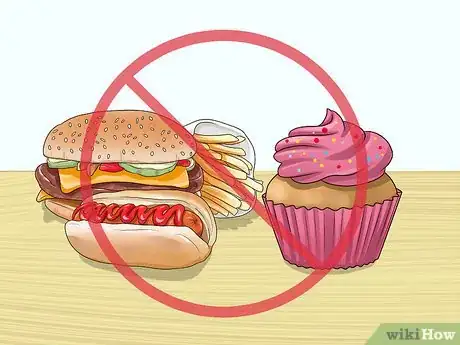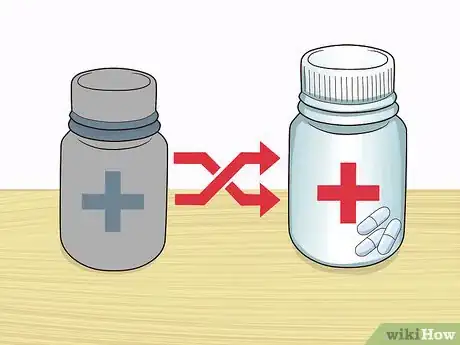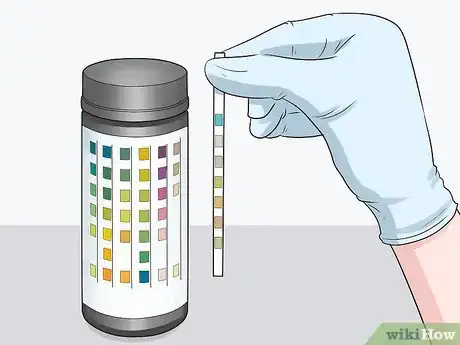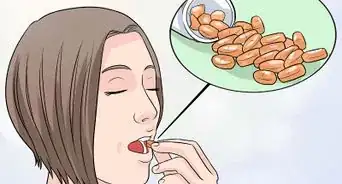This article was medically reviewed by Luba Lee, FNP-BC, MS. Luba Lee, FNP-BC is a Board-Certified Family Nurse Practitioner (FNP) and educator in Tennessee with over a decade of clinical experience. Luba has certifications in Pediatric Advanced Life Support (PALS), Emergency Medicine, Advanced Cardiac Life Support (ACLS), Team Building, and Critical Care Nursing. She received her Master of Science in Nursing (MSN) from the University of Tennessee in 2006.
This article has been viewed 42,139 times.
Urobilinogen is a compound found in your urine. It is a product of the bilirubin in your body that is eventually eliminated through the kidneys. Normal urobilinogen levels are low, so increased urobilinogen levels mean that there is a possibility that you have liver problems such as hepatitis, poisoning, or cirrhosis. If you have elevated urobilinogen levels, you should go see your doctor immediately.
Steps
Regulating Urobilinogen Levels at Home
-
1Eat plenty of fruits and vegetables. A healthy diet full of fruits and vegetables promotes a healthy liver and normal urobilinogen levels. Red veggies and fruits contain compounds that can help lower bilirubin levels, which will help lower your urobilinogen levels. Tomatoes is a great food to eat to help with this.[1]
- Radishes are also a great vegetable to promote liver health.
-
2Include fiber and healthy grains into your diet. Fiber can help promote a healthy liver. In addition to fruits and vegetables, you can find fiber in healthy whole grains, rice, cereals, and nuts. Men should have around 25 grams of fiber each day, and women should have 35 grams.
- Barley helps remove toxins from the body and supports the liver.
Advertisement -
3Avoid processed foods. Unhealthy diets can impair your liver function and cause your bilirubin and urobilinogen levels to rise. Try to eat a diet full of mostly fresh, unprocessed, natural foods. Avoid refined sugar, refined carbs, fast food, fried foods, and prepackaged and processed foods.[2]
-
4Avoid drinking alcohol. Alcohol negatively affects your liver. Liver damage can lead to the buildup of fat in your liver, inflammation, and scarring of your liver, like in cirrhosis. Avoid drinking alcohol until you know the cause of your elevated urobilinogen level.
-
5Drink plenty of water. One easy way to help keep your urobilinogen levels at a normal level is to stay hydrated. You should drink at least eight 8-ounce glasses of water each day. Hydration is important for kidney and liver function.
-
6Lose weight. Your doctor may suggest that you lose weight and increase your physical activity if your urobilinogen levels are high. Some liver problems can be treated with weight loss, healthier eating plans, and exercise.[3]
- Talk to your doctor if you are interested in losing weight. They can suggest a diet and exercise plan that works for you.
Treating High Urobilinogen
-
1Change medications. If your abnormal urobilinogen levels are a result of a medication you are taking, your doctor may suggest that you stop taking a medication or switch to a different one. Stopping the medication may be enough to lower your urobilinogen levels.
-
2Take iron supplements. Anemia may be the cause of your higher urobilinogen levels. If that is the underlying cause, the doctor will prescribe iron supplements. Depending on the severity of the anemia, you may be able to take oral supplements or be given iron intravenously.[4]
- If you have severe anemia, you may be admitted to the hospital so the doctor can monitor your condition.
-
3Treat a liver condition in the hospital. If the high urobilinogen levels is caused by liver disease, your doctor will monitor your condition closely. If the disease progresses to a severe state, you may be admitted to the hospital. While in the hospital, you may be given antiviral drugs to help treat the condition.[5]
- If your liver is severely damaged, you may need a liver transplant.+
Diagnosing High Urobilinogen Levels
-
1Look for dark urine and yellowish skin. There are a few symptoms you can look for to determine if you have high urobilinogen levels. Your urine will be a darker color while your feces will be lighter colored.[6]
- Your skin and eyes may also have a yellowish tint to them.
-
2Go see your doctor. If you have high levels of urobilinogen, you should go see a doctor. Elevated urobilinogen indicates there is a problem with your liver. Many serious and potentially fatal liver diseases cause higher urobilinogen levels, so you should see your doctor immediately.[7]
- For example, you may have liver cirrhosis, liver cancer, or hepatitis.
-
3Test your urine. If you believe you may have elevated urobilinogen levels, your doctor will recommend a urine test. You will be given a test stick that reacts to urobilinogen to determine if your levels are elevated. Then, if the test stick is positive, the doctor will perform a test to determine how much urobilinogen is in your urine.
- The doctor will probably also test your blood and liver function at the same time.
References
- ↑ http://www.belmarrahealth.com/elevated-bilirubin-adults-causes-home-remedies/
- ↑ http://www.belmarrahealth.com/elevated-bilirubin-adults-causes-home-remedies/
- ↑ http://www.mayoclinic.org/diseases-conditions/liver-problems/basics/treatment/con-20025300
- ↑ http://www.mayoclinic.org/diseases-conditions/iron-deficiency-anemia/diagnosis-treatment/treatment/txc-20266592
- ↑ http://www.mayoclinic.org/diseases-conditions/liver-problems/basics/treatment/con-20025300
- ↑ http://www.hopkinsmedicine.org/healthlibrary/conditions/liver_biliary_and_pancreatic_disorders/common_characteristics_of_liver_disease_85,P00664/
- ↑ http://www.mayoclinic.org/diseases-conditions/liver-problems/basics/symptoms/con-20025300






















-Step-16.webp)
















































Medical Disclaimer
The content of this article is not intended to be a substitute for professional medical advice, examination, diagnosis, or treatment. You should always contact your doctor or other qualified healthcare professional before starting, changing, or stopping any kind of health treatment.
Read More...